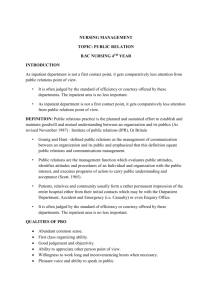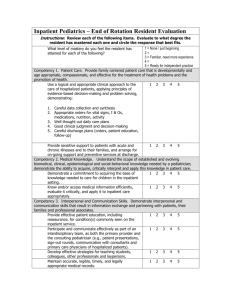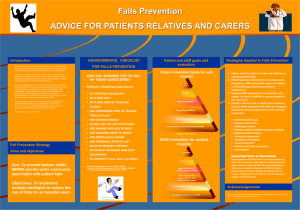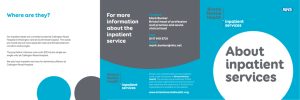Quality Account 2010 / 2011
advertisement
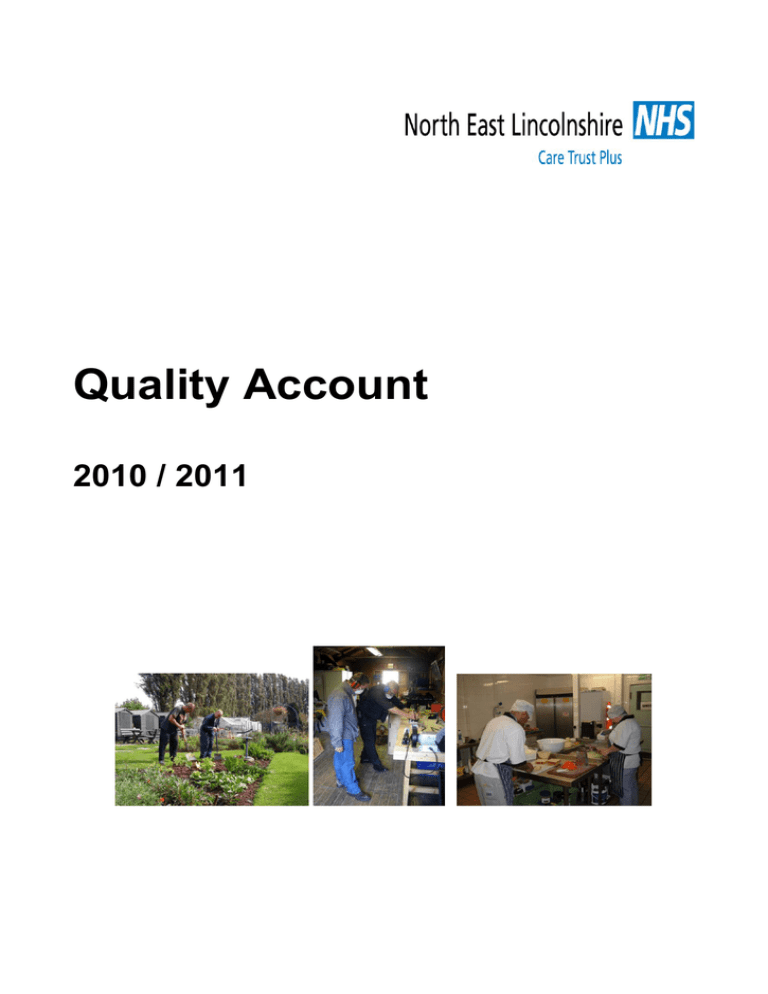
Quality Account 2010 / 2011 QUALITY ACCOUNT TABLE OF CONTENTS: Statement by Director of Mental Health Services Introducing North East Lincolnshire Mental Health Services Care Quality Commission Visits by the Commission to inpatient units Registration Performance, data quality and assurance Data quality Crisis resolution services 7 day follow up Home treatment Acute inpatient user survey Early intervention Suicide Quality across the service Clean and safe environments Assessing and managing risk Learning from significant and untoward incidents Training to support a quality service Quality inpatient environments Service users and carers contribute to quality services Clinical research Conclusions on 09 .10 Priorities for 2010 / 2011 Renewing accreditation for the adults inpatient unit by the Royal College of Psychiatrists Review services for the Black and ethnic minorities Improve information for patients on medication Make greater use of audits to learn form patient experience Increase the use of outcome measures to gauge clinical improvement 2 Introduction Statement of Quality from the Director of Mental Health Services I am proud to present the first quality account for the trust which illustrates the importance of Quality within the organisation, and how we improve in the coming year. From 1st April 2010 it is a legal requirement to produce a „Quality Account‟ to focus on the quality of services and treatment we provide. The NHS Next Stage Review; High Quality Care for All (2008) provides the framework for including the content of a quality service. Patient Safety – that the NHS does no harm to patients , the environment is safe and clean and any avoidable harm is reduced. Clinical Effectiveness – understanding if the treatment provided is effective and leads to incurring mental health. Patient Experience – do the patients who receive our services feel they were treated with dignity and respect and that we invited them to tell us of their experience so that we can improve services Service users in North East Lincolnshire have clear views on what they expect from a quality service which is: Control over their own care Real choice in meeting their individual and person needs Services which are accessible, responsive and where necessary, intervene early. There are some significant challenges in meeting the very individual and personal needs of patients, for all patients, for all of the time. This Quality Account concentrates less on figures, data and tables but rather gives an overall picture and sets the scene of the broad work that contributes to quality across the Directorate that impact on the experience of patients. Staff across the Directorate through their hard work, commitment and the positive values which underpin our work, believe that by working in partnership with patients, that recovery is a real prospect with a positive message of moving towards to a life lived with purpose and meaning. Kevin Bond Director of Mental Health The Eleanor Centre 21 Eleanor Street Grimsby DN32 9EA Email: Kevin.bond@nelctp.nhs.uk Tel: 01472 625832 3 Introducing North East Lincolnshire Mental Health Services North East Lincolnshire includes the towns of Grimsby, Cleethorpes and Immingham and immediate surrounding countryside with a total population of 165,000 people. The Mental Health Service, which is the only service in North East Lincolnshire is one of the smallest in the country, but with that has some significant advantages: The Social Care and Health Staff are integrated into the one service – there are no demarcation problems between the council and the health service. The NEL Council and the Primary Health Care Trust cover exactly the same geographical area, therefore joint work and collaboration is significantly greater than other areas. The local profile of the senior team in the mental health service means they are more visible to patients and to local people and their representatives – because they are based in Grimsby and respond to local needs and concerns. The Council and the health community have recognised the importance of mental health services to the wellbeing of everyone, and they have supported both politically and financially the modernisation of local services, to include: A purpose built inpatient unit for older people . A purpose built inpatient unit for working adults (Harrison House) A new building for open access to psychological therapies (Open Minds) Alongside this, there are many features to our services which lead regional practice in the delivery of services: Our impatient services do not use seclusion rooms to manage challenging behaviour. Our Community Mental Health Teams are physically based in Primary Care Centres to develop and enhance joint working with GPs Our open access service for employment and training for vulnerable people including those with mental health needs (Tukes) won a National Award in 2008 presented in London by the Secretary of State for Health. Access to psychological therapies is the only direct public access service in the region, with a town centre location. We do not use standard NHS control and restraint techniques which can induce pain and injury. We promote and sell across the country a different training with greater emphasis on de-escalation and non-confrontation. We try to get the service right each and every time we deliver services to patients. This quality account gives some further information on how we are starting to deliver quality – and keep those in our care safe. 4 Transport Services, triage and medical advice provided remotely Care Quality Commission Our current registration status is “registered without conditions” for health care services however, we await final notification of registration status on 1 st October 2010. The Care Quality Commission visited all inpatient areas in 2009/10 and several areas of good practice were noted including the high standards of cleaning and catering. Several deficiencies were noticed in inpatient paperwork which has been corrected. Nothing was noted that was a concern to the safety of patients In the coming year we will be working towards registration of the Social Care services were successfully for the following registered activities: During 2009/2010, the Care Quality Commission has not taken enforcement against us as provider of Mental Health Services of the Care Trust Plus, implying the systems, processes and outcomes we have in place do recognise patient safety and quality. This has been supported by internal auditing and scrutiny in April 2010 by an independent body that stated „significant assurance‟ was provided and that the controls in place are sufficient and consistently applied so as to minimise risks to patients . Treatment of disease, disorder or injury Diagnostic and Screening Transport Services, triage and medical advice provided remotely .Performance Assurance , data quality and Accurate and timely data is paramount in meeting the needs of our service users. It enables delivery of effective, relevant and timely health care, minimising clinical risk and it gives confidence that the data we monitor our service against is correct Care Quality Commission Registration On the 1st April 2010, our health services were successfully registered with the Care Quality Commission (CQC) under the new regulatory framework for the following registered activities: The trust makes data submissions to the Government Information Centre quarterly. which contain case record level data about the care of adults and older people using secondary mental health services. Accommodation for persons who require treatment for substance misuse The data submissions are designed to provide local clinicians and managers with better quality information for clinical audit, service planning and management. At a local level it also monitors the performance of individual teams and healthcare professionals the outcomes of care for patients, and at a national level, to monitor the delivery of national service framework priorities, facilitating feedback to trusts and the setting of benchmarks. Treatment of disease, disorder or injury Assessment of medical treatment for persons detained under the Mental Health Act Diagnostic and Screening In 2008/09 the trust had 98.95% data completeness of the Minimum Dataset 5 which includes the patient‟s NHS number, Marital Status, GP Practice and Postcode. Reports were devised to highlight missing fields within the trust‟s Patient Administration System and we expect the results for the same fields in the 2009/10 assessment to be above 99.625%. Results have not yet been published on the CQC website. to the 7 day deadline. This has led to improvements in the quality and timeliness of the service which helps guard against suicide risk. The number of service users receiving treatment and support in their own home has also increased in line with the ethos of the service which delivers care and treatment in a familiar environment away from the traditional hospital setting. There were 363 home treatment episodes in 2009/10 compared with 268 in 2008/09. In 2009/10 our commitment to improving performance was reflected in a number of key measures used by the Care Quality Commission (CQC) to monitor national priorities. The national priorities assessment looks at performance against priorities set during the Department of Health's 2008-2011 planning round. These include goals for the whole of the NHS, such as reducing health inequalities and improving the health of the population. Listening to and acting upon service users‟ feedback has enabled the Trust to realise excellent results in the 2009 service user inpatient survey carried out by the Care Quality Commission where North East Lincolnshire performed in the top 20% across all mental health trusts nationally for the majority of questions. The survey of acute adult inpatient mental health services involved all NHS trusts providing mental health inpatient services. People were eligible for the survey if they were aged 16-65, had stayed on an acute ward or a psychiatric intensive care unit (PICU) for at least 48 hours between 1 July 2008 and 31 December 2008 and were not current inpatients at the time of the survey. In 2009/10 performance improved on Access to Crisis Resolution Services. This measure examines whether our crisis service functions properly as a gateway to inpatient care and facilitates early discharge of service users. In 2008/09 89.96% of service users were assessed by the crisis service prior to inpatient admission. This improved significantly in 2009/10 to 95.6% after the directorate re-examined local practice particularly in relation to service users admitted under the Mental Health Act. Evidence from research indicates that the earlier the identification of psychosis and the commencement of treatments, the better the long term outcomes for the patient. Our team works with people from 14-35 years old whose behaviour or presentation suggest that further assessment of their needs is warranted. Many will not require services but for those who do, they are actively managed to retain education, employment and family relationships whist receiving treatment. We significantly exceed our regional target for new cases . There is firm evidence that there are higher than average risks associated with patients who have been discharged from an inpatient unit then other service users .The national standard is that they are all followed up with either a telephone or face to face contact within 7 days of discharge from inpatient care. Our performance improved from 95.3% of discharges followed up in 2008/09 to 99.4% in 2009/10. This is largely owing to a weekly report which enables staff to highlight any service users who have been discharged and not yet visited prior All inpatient areas are designed to minimise the risk of suicide, for example the use of ligature points. The curtain 6 rails, the windows and all other potential risk points are designed with the minimisation of risks in mind. There have been no suicides in our units for more than the last decade. team from the Care Trust Plus regularly audit clinical practice. We use the nationally recognised Infection Control Nursing Audit as the tool to audit our infection control standards in our inpatient units, where the evidence supports that we are fully compliant with the standards. The Public Health Directorate completed in September 2009 an audit of all suicides as defined by the coroner in 2008. Of the 14 suicides, 10 were known to Primary Care only and 4 were known to the Mental Health Service. Each of these 4 were then subject to further intense and specific review to determine whether clinical and organisational practice should be altered to take account of the findings. Some of the findings include: In 2009/10 there was no cases of hospital acquired Methiallin Resistant Staphylococcus Aureus (MRSA), bacteraemia, nor Clostridium Difficle (C Diff) on our inpatient units – except for one case of the former which was present on a patient transferred to us from another hospital. The infection was contained and it did not infect anyone else. Greater attention to be paid on past history Assessing and Managing Risk Keeping people safe requires an understanding of risk in the context of their mental health and this Directorate uses DICES as an evidence based assessment and risk management process .It is a methodological and effective way of assessing and managing risk which uses a series of checklists to identify the key factors in judging each type of risk. The risk management tool DICES was not always being used appropriately. The required changes to practice have been made Quality Across the Service Providing a clean and safe environment is very important to our patients, their carers and to ourselves as service providers. Brief DICES is carried out by the clinician in the first instance if there are specific concerns regarding violence, self-harm, self-neglect, substance misuse, or vulnerability to exploitation. Once a risk is identified the clinician must develop a risk management plan and share that plan with other people in the care team. In 2005, we changed our cleaning contractors from a national company to Tukes, who are an employment and training enterprise for people with mental health needs and part of the Mental Health Directorate. The cleaning staff are properly paid on national terms and conditions, and the dimension they add is their commitment because they have used the service themselves, and hence create an environment that they want for themselves. The result has been a significant increase in the quality of cleanliness maintained continuously to a high standard. D-describe the risk I- identify your options C- Choose your preferred option E-Explain your choice S-Share with relevant colleagues. Training in this approach takes place over a 3 day period and clinicians have annual updates, one face to face, one online and one a review of five cases with the supervisor. Preventing the spread of infection is a key priority to us and the infection control 7 Eating Disorders Deltoid Site Training (to give injections) Health & Safety and Risk Awareness Appropriate Adults Training (to act under the Criminal Justice Act) Supervised Community Treatment Update Basis Life Support Mental Health Law AMHP Refresher Mental Health & Learning Disability Update BNF Chapter 4 Drugs Used In Mental Health Children & Mental Health Law Refresher Introduction to Deprivation of Liberty Safeguards (DOLS) AMHP Refresher, Nearest Relative Safeguarding Children Level 1 – CTP Dignity in Care of Older People Mental Health Emergency First Aid Infection Control Training Difficult and Disturbing Behaviour The risk assessment tool DICES is used quickly to identify risk both to staff, other patients or to themselves or injury or self harm. An audit compiled in 2009 considered the use of DICES as a management tool and whether there should be changes in practice. It was found to be used to form a risk management plan in 96% of the time and used in Care Plans 100%. The area for improvement was in its implementation and use on the inpatient areas. Learning from Significant Untoward Incidents When such incidents arise, the Directorate is committed to reflecting on the incident and how we could respond differently should it arise again. Some of the key points in 09/10 have been: Insufficient attention to relevant historical clinical risk information to incorporate that into care plans. Reminder to staff that the best use of DICES is as a risk assessment and management tool – aid. It does not negate the need for clinical judgement Managers should view as routine, a random selection of case files on a regular basis to ensure themselves of the quality of recording and decision making. We need to audit both the files and the assessment process to confirm that these are both properly used, completed and acted upon. Quality Inpatient Environment As regards respect and dignity the national standard is that only members of the same sex will share a room where they sleep, and share same sex toilets and bathroom. In North East Lincolnshire, we exceed that standard. Every inpatient bedroom is a single en-suite room. No patient has to share facilities with another patient. The adult inpatient unit was operational from February 2010 and it has a number of features to improve the quality of the experience received by adult inpatients Training to Support a Quality service To support a quality service, training in professional practice on continuing professional support is important and in 2009/10 the training provided to staff involved: The units are small with 2 x 10 beds , for general inpatient care and 5 beds additional care unit ( with an additionally secure room in addition ) which will help to manage behaviour because as research indicates the Rapid Tranquilisation Risk Assessment & Management (the DICES Program) Suicide Prevention 8 larger a group , the more problematic group behaviour All units are single story – no prospect of injuries or incidents on stairs or from upstairs windows All bedrooms in the two 10 bed units have individual fobs to secure the door – so patients cannot walk uninvited into other patients bedrooms and should it be important to a patients it can be set for example to only allow female staff into female bedrooms The emphasis is on a non clinical atmosphere therefore carpet throughout ( no lino ) and nothing purchased from the standard NHS catalogue – all individual items from local independent shops All patients in the two general units have their medicine stored in medicine cabinets in their bedrooms – so although they do not directly access it themselves , there is not the classic practice of queuing for the medicine trolley All patients have direct access to make hot drinks at any time – they do not have to ask , nor are their drink rounds at predetermined times Service Users and Carers Contribute to Quality We value and acknowledge the contribution to improving the quality of our services that those who have used the service can bring. The North East Lincolnshire Service User and Carer Independent Forum have significant influence by: Having 6 Service Users and Carers as members on the Mental Health Board (with paid expenses) to debate, help decide and influence the decisions to be taken on the future on services. All staff appointments including Consultants and the Medical Director have a service user or carer on the interview panel. They undergo the same 2 day recruitment and selection training as the other panel members All junior doctor induction programmes (twice a year) have a presentation by Forum Members on their experience of receiving the service – and what they expect from medical staff Our training programs are enhanced by the involvement of users and carers who comment their experience to the topic. This is particularly the case in training on challenging behaviour where service users who have been restrained relate their experience. As regards the older people service , there are two units of 5 beds each , again quite unusual because of the high running costs of small units but again , a quality environment is best delivered to small numbers of people ,.They are separated into functional and organic units to enable specialist care but a feature throughout is that every bedroom has a kitchenette ( which helps assessment of daily skills ) so that with the appropriate risk assessment they can make their own drinks and snacks . The kitchenette is in a small lounge area integral to each bedroom, which has a sofa bed which allows carers and spouses to stay with the patient overnight. Again medicines are kept in a cabinet in each bedroom 9 Participation in Clinical Research In 2009/10 we began working in partnership with Professor Stephen Curran and his team in Wakefield, looking into setting up a research study into the use of Transcranial Magnetic Stimulation (TMS) for the treatment of moderate to severe depression (in line with NICE guidance 242) and in cooperation with our local mental health independent user and carer forum. Currently in the UK there are other forms of treatment for depression (NICE Guidance 90) which include sleep hygiene, psychosocial and psychological interventions, Pharmacological management and finally Electroconvulsive Therapy (ECT). There are potential adverse events with ECT, notably cognitive impairment also risks associated with a general anaesthetic and whilst it can achieve significant results there is a growing body of evidence that in cases of moderate and severe depression TMS is a safe non invasive technique, free from serious side effects however NICE guidance 242 does not feel that there is sufficient evidence to allow this as a main line treatment unless within a research field. Working with Professor Curran and his team, we hope to be able to commence a large scale research study to show that this form of treatment for depression can be as effective as ECT but with no negative side effects and are awaiting Ethics agreement for us to commence. 10 Conclusions on 09.10 As this is the first quality account, it concentrates on describing the many aspects of work which contribute to a quality service . No one aspect defines a quality service -- and many would say that quality can only really be assessed by the person who uses that service . In the complexity that is modern mental health services, quality has many dimensions. It is the overall combination of experiences for patients and their carers which culminate in their belief that they have received a service which they believe to be a quality one – or in some instances , that they have been failed In 2010/11 we will undertake more specific audits which involve greater engagement with people who use our services. We will review our services for people from the BME community, in particular, access to interpreter services and to consider what improvement could be made to help them access our services, and our response to their needs. Patients want to make informed decisions about their care and the choices available to them. We will review our approach particularly to medication to ensure they have written confirmation about both diagnosis and also the medication choice available. This quality account tells readers some of what we believe in – that seclusion and standard control and restraint techniques have no place in modern quality services, and that users and carers can teach us a great deal if we chose to listen We will conduct a specific audit in which those who have used our inpatient services are invited to comment on their experience. The quality account for 2010.11 will contain a little more detail and more action plans than this current introduction has provided as we move forward together with service users and their carers to ensure they have the experience they need – and that we want to provide In 2010/11 we will make greater use of outcome measures to assess whether the care and the treatment we have provided has made improvement in the mental health of our service users. We use the Health of the Nation Outcome Scales (HONOS), the Hamilton Depression Scale, and the GAD7 and PHQ 9, access the service and develop a wider program to use a greater variety of evidence based tools to inform our practice. Priorities for 2010/11 The re-accreditations of the adult inpatient service by the Royal College of Psychiatrists. This is an external, independent assessment over 3 days to consider all areas of practice against a Royal College framework on best practice concentrating upon: General Standards ie staffing Timely and purposeful admission Safety Environment and facilities Therapies and activities 11
